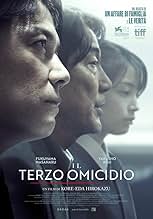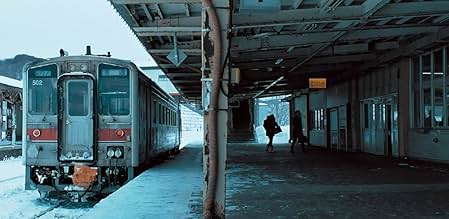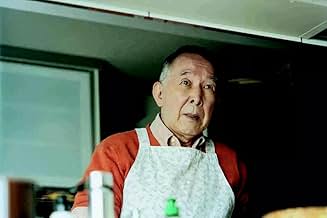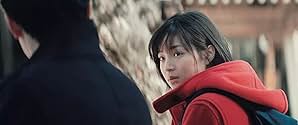AVALIAÇÃO DA IMDb
6,7/10
8,6 mil
SUA AVALIAÇÃO
Um drama judicial se concentra no assassinato do presidente de uma fábrica.Um drama judicial se concentra no assassinato do presidente de uma fábrica.Um drama judicial se concentra no assassinato do presidente de uma fábrica.
- Prêmios
- 6 vitórias e 17 indicações no total
Avaliações em destaque
The great lawyer Shigomori accepts a delicate case, the defense of Misumi, accused of theft and murder. Misumi, who thirty years earlier had served a prison sentence for murder, is now facing the death penalty. Astonishingly, the accused does not seem to care at all about his lot, the best evidence being that he does nothing to help his defender avoid it.
A specialist in childhood and family relations, Kore-eda ventures here into unfamiliar territory, the judicial thriller. The film raises interesting questions about the relativity of justice while at the same time keeping up the mystery: why does the accused, whose guilt is far from being proven, play cat and mouse with his defender and put obstacles in his way when he does everything in his power to save him from being hanged? Unfortunately, too much chatter and slowness diminishes the effectiveness of the film. But there are undeniable good points : the subtle acting of the two main protagonists, the beautiful nostalgic music by Ludovico Einaudi as well as the end of the film, a little more tonic than what preceded it. Quite a fair work on the whole but not up to the level of " Nobody Knows " or " Like father Like Son ".
A specialist in childhood and family relations, Kore-eda ventures here into unfamiliar territory, the judicial thriller. The film raises interesting questions about the relativity of justice while at the same time keeping up the mystery: why does the accused, whose guilt is far from being proven, play cat and mouse with his defender and put obstacles in his way when he does everything in his power to save him from being hanged? Unfortunately, too much chatter and slowness diminishes the effectiveness of the film. But there are undeniable good points : the subtle acting of the two main protagonists, the beautiful nostalgic music by Ludovico Einaudi as well as the end of the film, a little more tonic than what preceded it. Quite a fair work on the whole but not up to the level of " Nobody Knows " or " Like father Like Son ".
One of the most psychologically and thematically complex autopsies of truth, ethics, and morality I've seen. It reminds me of Rashomon in some respects, except that much of the fluidity and subjectivity of truth in this movie is found within a single character, and within societal systems of "truth-seeking," i.e., the "justice" and legal systems. Even the camera movement in this film is perfectly attuned to those themes, subtly moving into, over, and out of scenes from all directions. Koji Yakusho is superb as usual, and all other acting and casting is excellent as well, as is the score and the editing. I will be thinking on this one for a while.
It's interesting that Koreeda approaches an apparent thriller in the same way he approaches his family dramas. In fact, this is a drama and, as usual for him, a film about people and grey areas. Here, he addresses the difference between legal justice and what may be ethically acceptable even if a crime.
It's not an easy film, with a quite slow pace and few events that capture our interest. Despite loving thrillers and loving Koreeda's usual style, this film left me wanting much more. Nevertheless, the approach is interesting, the performances are very good, it's beautifully shot (with incredible mirror shots), and the ethical issues it raises stay with us.
It's not an easy film, with a quite slow pace and few events that capture our interest. Despite loving thrillers and loving Koreeda's usual style, this film left me wanting much more. Nevertheless, the approach is interesting, the performances are very good, it's beautifully shot (with incredible mirror shots), and the ethical issues it raises stay with us.
Included in the extras on the Arrow disc of this film is a very thoughtful piece by Tony Rayns. He was careful to avoid as many spoilers as possible and as it turns out I would have done well to listen to him before watching the film. The Japanese judicial system, it turns out, is very different from everybody else's and the 'trial', it would seem is no such thing. Even with the recently reintroduced jury (who seem to play little part) the defendant is pretty much assumed guilty and the whole procedure an opportunity for society, in the form of the judge, to smooth things over and be as precise as possible as to sentence. All this would have helped when watching this rather long and complicated tale. Most of the 'complications' however occur in the matter surrounding admission of guilt and the fact that here, the truth and actual guilt are a moving feast (complete with seeming unreal flat-backs) makes for a difficult ride for the uninitiated. Powerful, nevertheless, with fine central performances and whilst I felt watching the film, that one viewing would be enough, learning more has led me to suppose another viewing might be more enjoyable.
I've just managed to catch up with this quite elusive film as I'm a big Akira Kurosawa film and from what I saw from the description and trailer, this would seem to be Koreeda's 'Kurosawa' film - there are obvious references to both Rashomon and High and Low.
The film indeed is clearly influenced by both those films, with a bit of Kurosawa's lesser known court drama Scandal thrown in. The plot follows a lawyer, asked by a colleague to assist with a seemingly straightforward capital punishment case. A middle aged man called Mizume is accused of, and has confessed to, the murder of a factory owner, and the theft of money. Mizume had only just been released after a long prison sentence for a previous murder. The lawyers job is to avoid the death penalty by trying to muddy the waters around the murder, and perhaps suggest it was an impulsive act and not planned (from what I can understand, Japanese law tends to have a range of gradations of homocide, with the judge ultimately deciding if it was serious enough for the death penalty).
The job of the lawyers is complicated by the apparent passivity of Mizume, and his constant changing of his story. At first, his explanations are just vague and contradictory, but he then states that he killed the man because he was paid by the mans wife to do so. As the main lawyer, Shigemora, digs deeper, he finds yet another possible motive.
I won't give away the ending, except to say that there is a 'probable' reason given in the end, but so many versions are given its not entirely clear what happened, or (seemingly the core question of the film) whether the truth is relevant at all to the operation of justice. Shigemora is caught in a Rashomon like situation of not knowing whether there is any one real truth, and whether knowing, or exposing, this truth is in any way relevant, morally, ethically or legally.
While the film sort of hedges the line between being a procedural and a more philosophical exploration of justice and truth (which reminded me a little of some recent Korean films such as Memories of Murder and Mother) the film also shows clear influence from High and Low as the main protagonist agonises over the guilty mans motivation, and starts to identify with him - shown rather allegorically in their prison conversations, with one face 'reflected' over another.
Rather like Kurosawa with Scandal and High and Low, the film seems to reflect the Directors concerns with the operation of justice in Japan, although those concerns seem pretty universal. In particular, the question of whether 'justice' and 'truth' are in any way compatible. Rather like Kurosawa's early films on the topic, the approach is perhaps a little too didactic for audiences not up to speed on the operation of the Japanese system.
As a film, I found it quite engrossing, while simultaneously a little frustrating. Koreeda is famous for a very deliberate, slow approach which in his best work absorbs the viewer into the life of his characters. Unfortunately, this type of film I think requires a more dynamic style, and the film is somewhat one-paced. Worse, it is hamstrung by some rather clunky didactic dialogue (the lawyer is followed everywhere by a young assistant, always asking stupid and naive questions which seem to have no other purpose than to explain to the audience what we are seeing), and some heavy handed metaphors. The two leads are good in the roles, but there is quite poor acting in some of the lesser roles - I think mostly due to the undercooked script and somewhat contrived plotting. I can't help feeling that Koreeda was trying to get something off his chest with this film, and found himself with a type of film making he's not really comfortable with.
So while the film is certainly quite gripping, and I found the insights into the Japanese court system very interesting, this is nowhere near the Directors best film. Its certainly worth anyones time with an interest in Japanese cinema to watch it, but be prepared I think to be a little disappointed if you are either a Koreeda fan (I certainly am), or for that matter, a Kurosawa fan.
The film indeed is clearly influenced by both those films, with a bit of Kurosawa's lesser known court drama Scandal thrown in. The plot follows a lawyer, asked by a colleague to assist with a seemingly straightforward capital punishment case. A middle aged man called Mizume is accused of, and has confessed to, the murder of a factory owner, and the theft of money. Mizume had only just been released after a long prison sentence for a previous murder. The lawyers job is to avoid the death penalty by trying to muddy the waters around the murder, and perhaps suggest it was an impulsive act and not planned (from what I can understand, Japanese law tends to have a range of gradations of homocide, with the judge ultimately deciding if it was serious enough for the death penalty).
The job of the lawyers is complicated by the apparent passivity of Mizume, and his constant changing of his story. At first, his explanations are just vague and contradictory, but he then states that he killed the man because he was paid by the mans wife to do so. As the main lawyer, Shigemora, digs deeper, he finds yet another possible motive.
I won't give away the ending, except to say that there is a 'probable' reason given in the end, but so many versions are given its not entirely clear what happened, or (seemingly the core question of the film) whether the truth is relevant at all to the operation of justice. Shigemora is caught in a Rashomon like situation of not knowing whether there is any one real truth, and whether knowing, or exposing, this truth is in any way relevant, morally, ethically or legally.
While the film sort of hedges the line between being a procedural and a more philosophical exploration of justice and truth (which reminded me a little of some recent Korean films such as Memories of Murder and Mother) the film also shows clear influence from High and Low as the main protagonist agonises over the guilty mans motivation, and starts to identify with him - shown rather allegorically in their prison conversations, with one face 'reflected' over another.
Rather like Kurosawa with Scandal and High and Low, the film seems to reflect the Directors concerns with the operation of justice in Japan, although those concerns seem pretty universal. In particular, the question of whether 'justice' and 'truth' are in any way compatible. Rather like Kurosawa's early films on the topic, the approach is perhaps a little too didactic for audiences not up to speed on the operation of the Japanese system.
As a film, I found it quite engrossing, while simultaneously a little frustrating. Koreeda is famous for a very deliberate, slow approach which in his best work absorbs the viewer into the life of his characters. Unfortunately, this type of film I think requires a more dynamic style, and the film is somewhat one-paced. Worse, it is hamstrung by some rather clunky didactic dialogue (the lawyer is followed everywhere by a young assistant, always asking stupid and naive questions which seem to have no other purpose than to explain to the audience what we are seeing), and some heavy handed metaphors. The two leads are good in the roles, but there is quite poor acting in some of the lesser roles - I think mostly due to the undercooked script and somewhat contrived plotting. I can't help feeling that Koreeda was trying to get something off his chest with this film, and found himself with a type of film making he's not really comfortable with.
So while the film is certainly quite gripping, and I found the insights into the Japanese court system very interesting, this is nowhere near the Directors best film. Its certainly worth anyones time with an interest in Japanese cinema to watch it, but be prepared I think to be a little disappointed if you are either a Koreeda fan (I certainly am), or for that matter, a Kurosawa fan.
Você sabia?
- CuriosidadesThis is the first fiction film from Hirokazu Koreeda that was shot in anamorphic digital and framed in 2.35:1.
Principais escolhas
Faça login para avaliar e ver a lista de recomendações personalizadas
- How long is The Third Murder?Fornecido pela Alexa
Detalhes
- Data de lançamento
- País de origem
- Centrais de atendimento oficiais
- Idioma
- Também conhecido como
- The Third Murder
- Locações de filme
- Rumoi Station, Rumoi, Hokkaido, Japão(the three lawyers arrive in Rumoi)
- Empresas de produção
- Consulte mais créditos da empresa na IMDbPro
Bilheteria
- Faturamento bruto nos EUA e Canadá
- US$ 89.315
- Fim de semana de estreia nos EUA e Canadá
- US$ 10.670
- 22 de jul. de 2018
- Faturamento bruto mundial
- US$ 13.411.936
- Tempo de duração
- 2 h 4 min(124 min)
- Cor
- Mixagem de som
- Proporção
- 2.35 : 1
Contribua para esta página
Sugerir uma alteração ou adicionar conteúdo ausente














